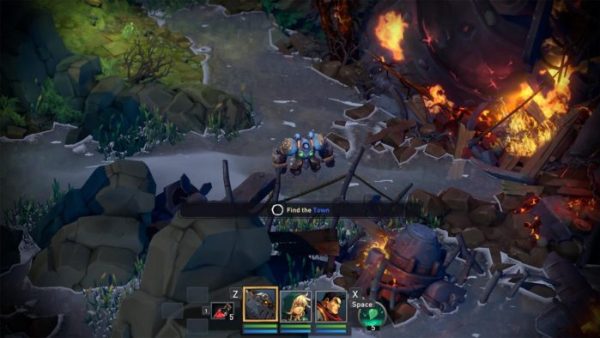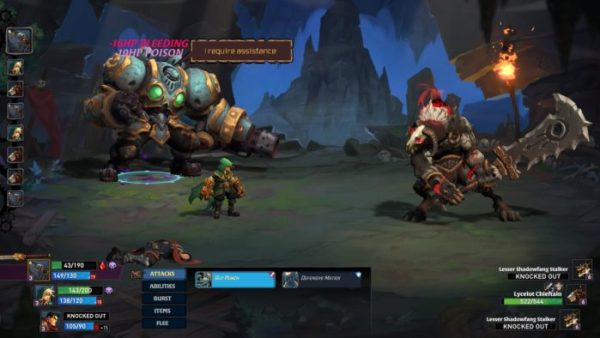Battle Chasers: Nightwar on PS4
Battle Chasers is a beloved comic book series with a troubled history. Lauded upon its 1998 release, it quickly emerged as one of the hottest franchises of its era. Scheduling problems, however, forced fans to endure painfully long waits in between issues, of which there were only nine in total, comprising a story arc never properly concluded. So when series creator Joe Madureira stated his intention to migrate the series to the video game industry, you could have forgiven anxiety from even its diehard cult following when backing its Kickstarter campaign. But they can all breathe a big sigh of relief. With Nightwar, Battle Chasers makes an excellent video game debut, achieving far more than just bringing to life Madureira’s stunning artwork in pretty animation. Taking its inspiration from iconic turn-based role-playing games of yesteryear, Battle Chasers: Nightwar pays homage to some of the genre’s best while injecting enough personality and inventiveness to stand apart as its own highly accomplished title.
Yet it certainly is the aesthetic of this JRPG-like dungeon crawler that immediately grabs your attention. Across every facet of Nightwar’s design, Madureira’s artwork is utterly gorgeous. Cutscenes, in particular, are a delight to behold, playing out in deliberately stuttered comic-like reels of hand-drawn animation. The charming nuance of that design choice permeates to every inch of its in-game design, with a consistency that draws the slightly different designs of each game mode together. I adore the washy watercolor palette of the overworld, the atmospheric dungeons are lush and vibrant, the silhouette of characters’ clean lines really pop during dialogue, and battle sequences feature wonderfully slick animations. All of this is complemented by a superb score and brilliant sound effects.
In fact, it’s only when one plays a game with this level of aesthetic charm that one appreciates what a crucial role it plays in immersion. Environments look compelling when they might otherwise seem ordinary, and archetypal characters suddenly seem far less samey with such brilliantly drawn designs. That’s a good thing, too, because at first glance, Nightwar’s characters are about as tropey as fantasy/steampunk role-playing games get. There’s the spunky young heroine with extraordinary potential, the gentle giant sentinel who watches over her, the combat veteran with a surly disposition but a heart of gold, a wise-cracking wizard, a sassy rogue, and the quintessential mystery man.

Their story begins after being teleported to a mysterious island following an ambush, with main protagonist Gully and her pals seeking to find their missing friends somewhere amid this eerie locale. As it turns out, though, the island is being overrun by a dark necromancer that our heroes are eventually implored to defeat. It’s hardly groundbreaking stuff, though there are some interesting twists in its final act. Importantly, however, these Battle Chasers are actually fairly well written. There aren’t individual story arcs per se, and no romances either, but the strength of bond between each character is certainly made interesting by some accomplished dialogue, even if the growth of their personalities never quite flourishes satisfactorily.
The story and slightly two-dimensional characters, however, take a backseat to Nightwar’s gameplay, which is split across three different parts: the overworld, exploration areas and dungeons, and battle sequences. Traveling between main areas of interest across the island’s overworld, control of your party is limited to a linear path not dissimilar from a board game in appearance. Enemies, dungeons, and loot are represented by icons that you move toward and interact with. Searching explorable areas or dungeons switches gameplay to a 3D isometric experience with pre-rendered backgrounds. Each dungeon’s difficulty can actually be adjusted, with more challenging modes offering better loot as a reward. In these areas, each character has an ability to aid traversal which can be used a number of times — a phase shift, for example, to evade enemies, or a healing ability to recover HP and Mana. Dungeons bring with them not only the challenge of combat but some basic platforming, optional side quests, and mini-activities such as a fishing mini-game. Here, enemies appear in real-time and will attack on sight, shattering the screen when they intercept you to signify the beginning of a battle sequence.

Nightwar’s battle system is certainly influenced by JRPG classics from the golden era of the genre, though there are some neat twists on these tried and tested mechanics. The overcharge system is central to these innovations, a resource generated by striking enemies with weaker melee attacks. Overcharge is used in place of mana, stacking on top of it to supplement its total, and many abilities increase in damage and effect depending on how much you have at your disposal. There’s a real strategy as to how and when to both generate and use overcharge, which adds a unique layer to battle tactics. Good thing, too, because while grinding isn’t over the top, it’s still a JRPG hangover that is still very much part of the game’s dynamic. I didn’t find myself having to spend too long battling low-level monsters for additional XP, with most dungeons featuring enough mini-bosses, and enemy encounters on the overworld numbering just about enough that I rarely had to waste too much time leveling up. Yet Nightwar does still feel dated in necessitating this sort of action even occasionally.
Distractions beyond progressing the main story and grinding combat are fairly limited. Most of your time outside battling is spent investing resources into the game’s crafting system, which allows you to enhance and customize abilities beyond standard perks earned from leveling up. Townships do feature optional side-quests in the form of Hunts, but these optional areas are really just additional dungeons or bosses to clear for XP. There are, however, plenty of secrets to unearth, often alluded to via the countless pages of lore to uncover and read; fans of the comic books will find a huge volume of lore to immerse themselves in.
In the end, Battle Chasers: Nightwar is 40-or-so hour JRPG experience that’s well worth the time invested. Although its storytelling likely won’t inspire anyone but diehard fans of the comics, it has enough clout to keep franchise newcomers motivated, and importantly, it’s accessible enough for those unfamiliar with the source material to jump in too. The characters are likable enough, albeit somewhat generic — their cool designs at least make them memorable. Indeed, Nightwar is an astoundingly good-looking role-playing game across the board. But it’s so much more than a pretty face, backing up its charming aesthetic with a modern and innovative take on a classic battle system that will challenge and entertain even veterans of the genre. The game’s attractive dungeons and outdoor regions are tied together by plenty of lore and world-building, and there are just enough hidden treasures to claim to make exploration rewarding beyond visual charm.
Battle Chasers fans will be pleased to know that Joe Madureira’s work has found a new home in the gaming industry that we’ll certainly see more of. But perhaps more importantly, as someone who never knew about the source material before playing the game, I’ll be keenly looking forward to its next entry too.
SCORE: 4/5 – GREAT
PROS
| CONS
|

